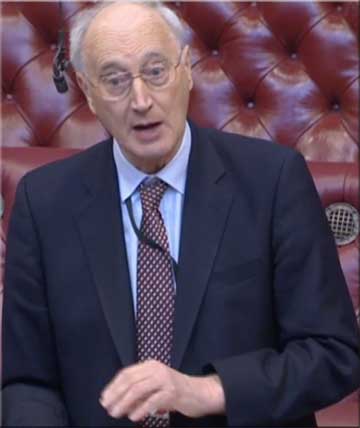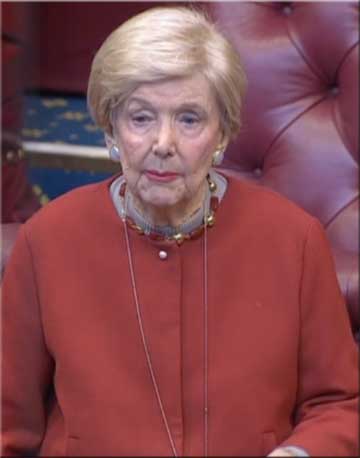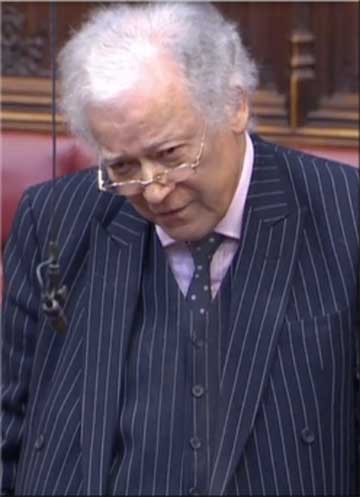
The House of Lords today discussed LKP suggested amendments to the Housing Bill to increase fairness for leaseholders.
Proposed by Lord Young of Cookham – better known as the former Conservative MP Sir George Young – the first of his two amendments aimed to “level the playing field—which is currently tilted in favour of freeholders—for leaseholders”.
The amendment would give leaseholders the right to obtain from their landlord contact information for other leaseholders in a shared block, for the purposes of obtaining statutory recognition of a tenants’ association.
This is vital when leaseholders are dealing with an aggressive landlord, who will not provide accounts and who will summon up legal muscle to stifle a right to manage initiative.
In this case at West India Quay, in London’s Docklands, the freeholder spent £74,500 for an afternoon in the property tribunal to thwart recognition of a residents’ association, which can send in auditors to see the accounts.
The full debate can be see here at 13.22:
http://parliamentlive.tv/event/index/c2809ebb-b2d6-4f28-8bce-fa63b5dda513
Or read here:
http://www.parliament.uk/business/publications/hansard/lords/todays-lords-debates/read/unknown/128/
The freeholder employed a QC, and threw in a libel threat at one of the residents for good measure.
A second amendment proposed by Lord Young addressed freeholders recovering mountainous legal costs from leaseholders through administrative charges.
“At the moment, a landlord can recover their costs for appearing before a tribunal or court as an administration charge where a covenant exists in the lease, without the leaseholder being able to ask the tribunal or court to consider the reasonableness of the costs, which they are able to do when the costs are recovered via the service charge,” said Lord Young.

“This is potentially unfair and can discourage leaseholders from exercising their rights to seek a determination that service charges or other payments are payable and reasonable, where they are aware that the landlord can recover his costs in this way through this loophole.
“The proposed amendment would enable the court or tribunal to consider on application whether it is reasonable for a landlord to recover all or part of the costs of appearing before it as an administration charge, where the lease allows this. At the moment, that cannot be done.”
The Dennis Jackson case, where a £7,000 dispute escalated into tens of thousands of pounds in legal fees and a forfeiture action of a £800,000 Battersea flat, showed how administrative charges can be ruinous.
“… This is not to say that a landlord should not be able to recover his costs, but rather that a tribunal or court should be able to consider whether it is reasonable so to do.”
Returning to the issue of contacting leaseholders to form a residents’ association, Lord Young said that this was particularly difficult where leaseholders increasingly live abroad.
“Putting a note through a letterbox, for example, is not a satisfactory way of achieving contact because there are no guarantees that the subtenant will pass the note on to the landlord.
“There is also no obligation on the landlord to pass on information.
“This means that a number of qualifying tenants are not given the opportunity to take part in the formation of an association, which is frustrating and potentially weakens the ability of leaseholders to exercise their statutory right.”
Lord Young’s amendment was supported by Baroness Gardner of Parkes, The Earl of Lytton and Lord Campbell-Savours.

Lord Lytton said: “Why should the generality of long leasehold service charge payers in a multi-unit building foot the bill for the landlord pursuing a particular tenant on a landlord/tenant issue? On that point, he [Lord Young] is absolutely spot on.”
Lord Campbell-Savours added his own personal experience as a Westminster leaseholder to the debate: “We had the devil of a job tracking down the 168 members of our residents’ association, which we needed because we had 999-year leases.
“The reason was quite simple: in London most of the flats were owned by people from all over the world—Hong Kong, China, Singapore, Malaysia. How were we possibly going to get their addresses?
“When we approached the management company, which obviously had the addresses because it had to send them their service charges, for example, we were told that it was not within its rights to give us that information.
“The amendment moved by the noble Lord, Lord Young of Cookham, deals specifically with that problem and I think Ministers should be sympathetic.
“If they cannot be sympathetic today, perhaps civil servants could give the matter a little more thought when they are advising Ministers in the future during the course of the Bill.”
With agreement from Lord Young the amendments were withdrawn at the end of the debate after the government confirmed it is sympathetic to the proposals and asked for them to be reintroduced at the final report stage of the bill. This means the government solicitors will now amend the wording to appear in the standard format. So unless something happens at this late stage we now have much better legislation to help stop some of the enormous legal bills in service charge disputes and a much better means to help form a recognised tenants association.
While it is a small start to correcting the many faults in the system its importance should not be underestimated This is the first time since 2002 there has been any substantive change in leasehold legislation and the first time it has shifted in favour of the leaseholder.
LKP thanks Katherine O’Riordan, of Sir Peter Bottomley’s office, for pressing ahead with these amendments.





 Spot the difference: questions to LEASE, questions to LKP
Spot the difference: questions to LEASE, questions to LKP






















Thank you for this. It is important that it remains on the forefront as an issue and doesn’t get swept under the carpet. Any leaseholder facing difficulties from unscrupulous freeholder’s should bring them to the attention of their MP .
We would advise copying in to us. We can make sure that the leasehold issue is correctly expressed and that the email to the MP is copied into the LKP patron MPs who will ensure it is taken seriously.
Most MPs do not understand leasehold and loathe it as a constituency issue, because of its complexity. Most just send tokenistic holding correspondence, and I am not sure I blame them.
Many leaseholders do not understand the issues, which is why this website exists.
Of course, the entire sector, and the Leasehold Advisory Service, bemoan leaseholder ignorance. But the sector depends on leaseholder ignorance. And as Blythe Court showed, with multiple sets of solicitors failing to spot the lease variation clauses regarding ground rents, leaseholders are not alone in missing some of the scams in leasehold.
Very true. Also a lot of people view flats / leasehold ownership as a temporary stepping stone before they sell to buy a ‘proper’ (freehold) house. So freeholder’s take advantage of leaseholders being naive and poorly equipped to deal with whatever they throw at them.
Figures just released show that 50% of all property sales in London are now leasehold flats.
Michael,
Who’s produced these figures. As we found out when we produced our report there are a lot of questionable figures. We know almost all new build in London is leasehold but I’ve not looked at estate agents figures for existing stock sales which is where I guess these numbers come from?
Martin,
Forgive me, I forgot to make a note of the source. I believe from memory it was probably in the Evening Standard.